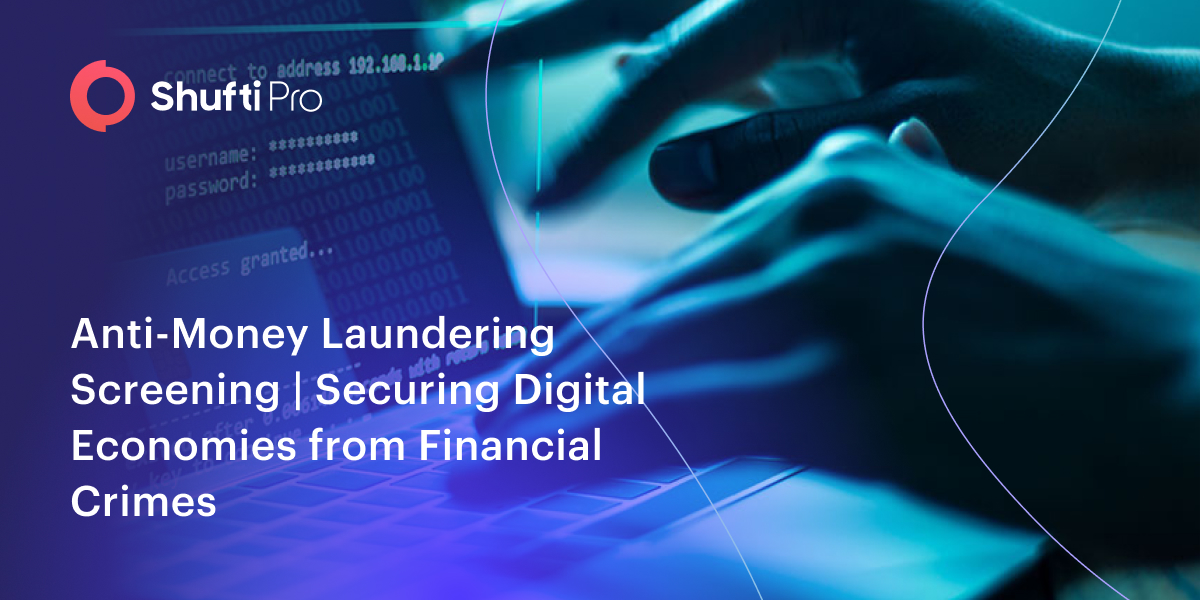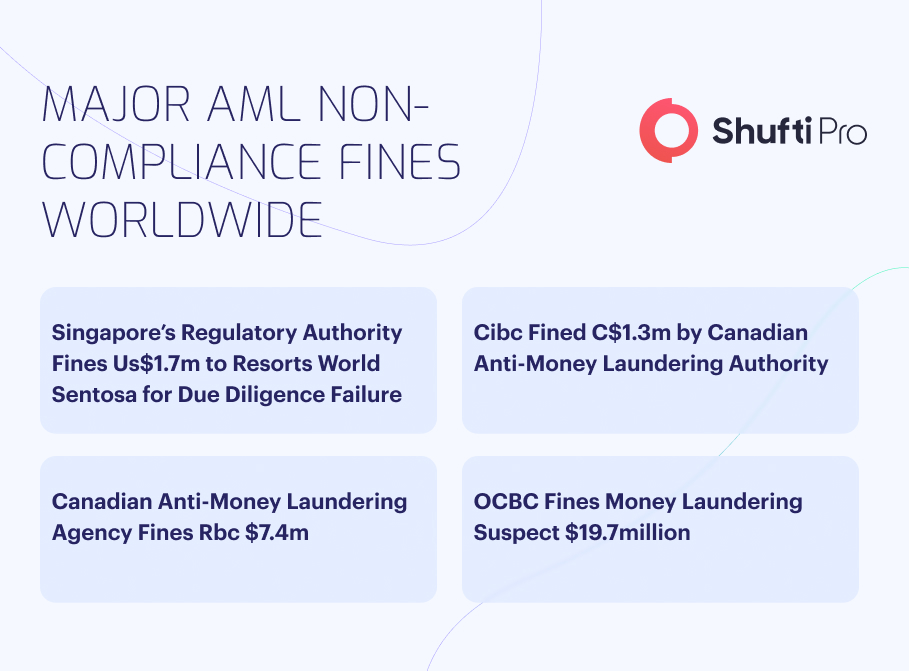Anti-Money Laundering Screening | Securing Digital Economies from Financial Crimes

The increased reliance on digital banking and the advent of virtual currencies in today’s digitized world has exposed the global financial industry to a myriad of white-collar crimes, such as money laundering, terrorist financing, corruption, and much more. Two to five percent of the global GDP is laundered every year that is equivalent to approximately $800 billion to $2 trillion. Although curbing money laundering and other sophisticated forms of financial crimes has been a focus of financial regulatory authorities as well as governments for the past decade, it has become imperative in the ever-changing, digital world.
To do so, prominent watchdogs like FinCen, FATF, AUSTRAC, etc, have developed anti-money laundering laws and standards to make it harder for criminals to wash their illicit gains. AML screening services are becoming the live savior for businesses and individuals as such AI-backed fraud preventive solutions can help them meet compliance, fight crimes, avoid non-compliance fines, and build trust across digital economies.
An Overview of AML Screening
Anti-money laundering screening is a process through which businesses carry out comprehensive evaluations regarding money laundering risk posed by potential customers. In addition to authenticating customers’ identities during the onboarding procedure, AML screening checks allow companies to undergo background checks against sanction lists, PEP lists, adverse media, and government databases.
However, it’s crucial to note that screening doesn’t meet all critical aspects of AML compliance requirements that companies must have in place. A complete anti-money laundering framework must include transaction monitoring, suspicious activity reporting, ongoing monitoring, and risk assessment.
AML Screening | Key Components of the Process
Anti-money laundering screening checks have become key to developing and executing effective AML compliance programs to reduce the surging crime rate and restrict financial criminals.
Transaction Monitoring
In this form of AML screening, businesses monitor customers’ transactions to determine suspicious financial dealings. The system automatically searches for patterns and anomalies leading to money laundering or other attempts at financial crimes. Transaction monitoring is a complex process, yet an effective way of limiting financial crime risks. Based on anti-money laundering compliance rules formed by global financial watchdogs, transaction monitoring is a key component of the AML program, because of the capability of identifying suspicious transactional patterns.
Enhanced Due Diligence
Under this category, businesses practice future checks other than simple customer due diligence practices to verify as well as identify risk levels associated with each client before getting onboard. Enhanced due diligence helps companies create customer risk profiles – ultimately limiting the increasing risk of financial crimes. According to FATF, Enhance Due Diligence EDD screening procedures must involve collecting additional information about customers’ transactions, including the source of income, their financial history and bank statements to better understand the risk levels.
PEPs and Sanctions Screening
In this process, businesses check customers’ information against the sanctions list, and government databases to verify their identities and ensure that they were not involved in any white-collar crimes. In addition to this, politically exploited persons are a serious threat to today’s financial industry as they have access to government funds, paving an easy way to commit crimes. PEP and Sanction screening are vital parts of the AML program as they shield organizations against emerging financial crime threats.
Prominent AML Non-Compliance Fines 2023 | An Eye-Opener for Global Industries
Since fraudsters became sophisticated enough to scale financial crimes, the challenge has always been layering illicit cash whilst hiding the source of earnings, particularly cash from financial regulatory authorities, so it could be spent freely. According to United Nations Office on Drug and Crime, “the conversion or transfer of property, knowing that such property is derived from any offense(s), for the purpose of concealing or disguising the illicit origin of the property or of assisting any person who is involved in such offense(s) to evade the legal consequences of his actions”. To curb the increasing risk of money laundering and other financial crimes, anti-money laundering regulations have been developed worldwide, and regulatory bodies are imposing hefty fines on businesses that fail to support the cause – either by neglecting AML regulations or helping criminals to route their illicit gains through the legal, financial system. Billions of dollars in fines have been imposed on companies worldwide in 2023, some of them as follows:

Canadian Anti-Money Laundering Authority Fined CIBC C$1.3m for AML Failings
The Financial Transactions and Reports Analysis Centre of Canada (FINTRAC) uncovered in the latest investigation report that the Canadian Imperial Bank of Commerce (CIBC) failed to comply with ongoing anti-money laundering obligations and failed to submit suspicious transaction reports, which led the Canadian Financial watchdog to impose a $1.3 million fines on the local bank. The agency also states that the bank didn’t provide detailed information about the international transactions their clients made in a significant amount. FINTRAC also alleged CIBC to be involved in money laundering and terrorist financing activities due to the link with the suspicious transactions. However, the bank admitted the allegation but stated they were not involved in any illegal activity.
FINTRAC investigated a vast range of information gathered from millions of electronic data sources from insurance, banks, and other financial service providers. They found thousands of dollars. The chief executive of FINTRAC, Sarah Paquet, stated, “Reporting suspicious transactions is to protect Canadians and secure the integrity of the country’s economy. We will also be firm in ensuring that businesses continue to do their part, and we will take appropriate actions when they are needed.”
Learn More: CIBC Fined C$1.3M by Canadian Anti-Money Laundering Authority
FINTRAC Imposes a Fine of $7.4m on RBC for Non-Compliance
Canadian AML regulatory watchdog, the Financial Transactions and Reports Centre (FINTRAC), has imposed a C$7.4 million penalty on the Royal Bank Canada (RBC) for not complying with anti-money laundering and suspicious activity reporting obligations. By law, the bank was obliged to report the financial watchdog regarding suspicious transactions. The agency claimed that the criminals transacted a significant amount of money through the banks. Additionally, various information from the bank was also transferred electronically. Furthermore, the investigation conducted by the watchdog also disclosed that out of 136 transactions, 16 of them were suspicious. However, the bank failed to report even though there were signs of money laundering and terrorist financing associated with these dealings. RBC stated, “We chose not to appeal but believe the fine is not commensurate with an administrative matter where there is no connection to money laundering or terrorist financing offenses. Equally important, no finding exists that anyone exercised judgment in bad faith or knowingly contributed to violations.”
Learn More: Canadian Anti-Money Laundering Agency Fines RBC $7.4M
Anti-Money Laundering Screening with Shufti
Here at Shufti, we understand entirely the cost of rising fraud cases and non-compliance whilst our experts know that one-size-fits-all is not what today’s digitized businesses need. Just because something works wonders for one company doesn’t mean that it will provide the same results to others. An industry-grade and built-in-class anti-money laundering solution will give your business flexibility and customization options to design an anti-money laundering compliance program that makes a perfect win-win scenario for your business.
With Shufti’s anti-money laundering screening solutions, businesses can easily navigate the complex regulatory landscape whilst onboarding legitimate customers by screening them against 1700+ financial crime databases in real-time with 99% accurate results.
Shufti’s AML Screening solution offers:
Batch screening
Screen your existing clients in bulk through Shufti’s real-time AML screening solutions to identify high-risk customers.
AML for business
Verify business entities and conduct background screening of ultimate beneficial owners UBO to reduce risk to zero.
Ongoing AML screening
Maintain updated risk profiles of your customers through ongoing AML screening to a predefined schedule.
Want to navigate complex AML compliance regimes with ease and fight fraud effectively?











